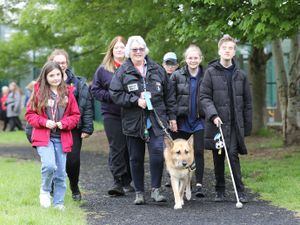University of Wolverhampton's new vice-chancellor wants to reach 'all sectors of the community'
The new vice-chancellor of the University of Wolverhampton has said he is determined to enhance its civic links and provide 'more opportunities for people in the city.'

Professor Ebrahim Adia took office at the start of this month and said he wants to make sure the university is doing more than just providing degree courses, by enhancing its civic role and opening up more opportunities for people in the city and region.
Born and raised in Lancashire with Asian parents, he was the first in his family to attend university and eventually went on to work in academic management at the University of Central Lancashire and the University of Bolton.

He also held a number of senior board roles in the NHS and worked closely with the devolved Greater Manchester Combined Authority where he had the role of deputy portfolio for Economic Strategy and Internationalisation.
In an exclusive interview with the Express & Star he said he wanted to use his past experience to put the university on a secure financial footing, invest in the student experience and help make it the 'employer of choice' for prospective academic staff.
Professor Adia said: "We need to up-skill people in the city to provide the training and qualifications which will make them employable in areas from the private sector to education and the NHS.
"We need to reach out to all sectors of the community to make sure they get the opportunity to be trained, whether they come to us when they are 18 or older than that, and that can be achieved by employing and retaining the best staff which is another important factor.
"It is about giving people in the city and beyond the skills to go on and work in all professions when they leave, whether that be education, which I went on to do, or other areas such as engineering, teaching or healthcare and hopefully that will still be within the catchment area of the university.
"The statistics show 70 per cent of all students come to us from within a 20-mile radius and a similar percentage are the first people in their families to go to university.
"Importantly, this means that after graduation, our students often stay in the area making a fantastic contribution in professions such as nursing, teaching or engineering for example and they spend their money supporting businesses in the city and region, whether that be through leisure or buying homes.
"We need to encourage all sectors of the community who have aspirations to learn and get on to come to us and see us as a viable option for them to get the experience and qualifications they are worthy of."
Last year the university confirmed it would not recruit students for 138 courses which had been suspended, with 250 jobs put at risk due to restructuring and up to 100 staff expected to leave through a mutually agreed resignation scheme.
In February this year an interim vice-chancellor – Professor John Raftery - was brought in to look at the situation and promised 'financial openness' after a chaotic period of course and job cuts.
Professor Adia said a 'transparent and open' regime would be encouraged and that he had already made a commitment to develop a new university strategy with the full involvement of staff.
According to Professor Adia, the development of the new strategy ‘presents an opportunity to think carefully about the character of the university, its academic portfolio, its research focus, its civic role and how we can deliver an exceptional staff and student experience’.
He said: "Any university faces tough choices over courses and their viability but the aim is still to keep a portfolio which will attract students of all ages and from all sectors of the wider community.
"And as much as we need to encourage students to come here, we need to encourage the best academic staff, lecturers and professors to see it as a good and sound employer which provides opportunities for them to further their career."
Although he was keen to move Wolverhampton up the rankings in the university 'league tables' – it currently stands 106th out of 121 (Guardian University Table, 2023) – he said he wouldn't be 'driven by metrics.'
He said: "I take the view that league tables do have their merits but we have to be careful not to be driven by them. This is a big university, the major one in the immediate area, and a big employer that enjoys a great relationship with the city and region it serves.
"We have to focus on delivering an excellent student and staff experience. If we get this right, improvements in metrics will inevitably follow.
"And it is important the university is an exceptional civic partner to all the stakeholders and organisations who have an interest in it, big or small.
"The areas I have lived and worked, like Bolton, Burnley and Greater Manchester, are similar in terms of demographics to Wolverhampton, though no two places are ever the same, and my aspiration is to ensure the university is of benefit to the people who live in the city and the wider region.
"There is plenty to build on but I am happy to be starting from a very good position, and I feel I am really fortunate to have the opportunity to lead such a fantastic institution."





